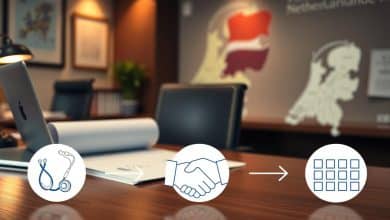Unlock Life-Changing Opportunities in Amsterdam, Netherlands: Visa Sponsorship and Application Steps
Anúncios
Amsterdam stands out as a thriving hub for global professionals seeking growth.
Its dynamic economy blends innovation with historic charm, attracting talent across tech, finance, and creative industries. Strategic connections to European markets and a business-friendly climate make it ideal for career advancement.
The city offers more than professional rewards. Residents enjoy world-class healthcare, efficient infrastructure, and a culture that prioritizes work-life balance. Competitive salaries, often exceeding €44,000 yearly, complement these advantages.
Navigating relocation requires understanding local employment frameworks. Clear documentation and tailored timelines streamline the process for applicants. Preparation ensures smoother transitions into roles that match international standards.
This guide breaks down essential steps for accessing Europe’s opportunities through structured pathways. From initial research to final approvals, readers gain actionable insights for turning ambitions into reality.
Introduction to Visa Sponsorship in Amsterdam
Securing work authorization in the Netherlands hinges on collaborative employer-employee efforts. Companies in sectors like technology and finance often facilitate legal permission for skilled professionals, leveraging Amsterdam’s status as a European business center. This partnership ensures compliance with Dutch regulations while addressing talent shortages in high-demand fields.
The Dutch system offers multiple pathways for temporary or long-term stays. Options range from short-term Schengen permits to specialized programs for entrepreneurs and self-employed individuals. Each category has distinct requirements, making tailored guidance essential for success.
Employers and applicants must work closely with immigration authorities throughout the process. Proper documentation and clear communication prevent delays. Many organizations partner with legal experts to navigate complex procedures efficiently.
Access to reliable information streamlines decision-making for professionals exploring relocation. Government portals and certified consultants provide updated resources about eligibility criteria and application steps. Thorough preparation reduces risks and accelerates transitions into rewarding roles.
Understanding these frameworks empowers candidates to identify opportunities aligned with their expertise. Strategic planning transforms bureaucratic challenges into achievable milestones for career growth.
Benefits of Securing a Visa Sponsorship
Professionals gaining legal work authorization unlock transformative advantages in one of Europe’s most dynamic cities. The Netherlands’ robust economy offers high employment rates and salaries that often surpass regional averages. This financial stability pairs with access to services that elevate daily living standards.
The country’s infrastructure supports seamless integration for international workers. Efficient public transport connects neighborhoods, while healthcare systems prioritize preventive care and specialist access. Educational facilities and cultural resources further enhance quality of life.
Work-life balance remains a cornerstone of Dutch professional culture. Full-time roles typically require 36-40 weekly hours, with ample vacation time for personal pursuits. Employers encourage flexible schedules to maintain well-being alongside career growth.
Income potential in major Dutch cities frequently offsets living costs. Competitive compensation packages reflect expertise levels, enabling professionals to save while enjoying urban amenities. Career advancement opportunities abound in sectors like tech and finance.
Support networks ease transitions through language courses and cultural workshops. Many organizations partner with relocation experts to streamline housing searches and administrative tasks. These services reduce stress during the adjustment period.
A welcoming environment fosters both personal and professional connections. With English widely spoken, newcomers quickly build networks while adapting to local customs. This inclusive atmosphere helps international talent thrive long-term.
Exploring Amsterdam’s Unique Opportunity Landscape
Global innovators and established enterprises converge in this European hotspot, creating unmatched career pathways. Leading firms like Google, Microsoft, and IBM anchor a thriving technology sector hungry for software developers and data experts. Local champions such as Booking.com and Adyen further amplify demand for specialized technical skills.
Finance giants like ING Bank drive growth by recruiting analysts and IT specialists for cross-border operations. Multinational corporations such as Philips and Tesla also dominate the market, offering roles in engineering and advanced manufacturing. Startups focused on artificial intelligence and digital transformation add to the city’s dynamic business ecosystem.
Emerging fields like AI and renewable energy fuel demand for professionals in project management and technical services. Consulting firms and professional services companies provide strategic roles for business analysts aiming to expand their European footprint. Competitive salaries reflect expertise levels, particularly in high-growth industries.
This blend of traditional and cutting-edge sectors creates a versatile environment for career advancement. Professionals find tailored opportunities that align with both niche skills and broader industry trends. Strategic networking and targeted skill development unlock doors to long-term success in this interconnected market.
Step-by-Step Guide to the Visa Sponsorship Application Process
Navigating work authorization requires a structured approach. Employers and candidates must collaborate to meet legal standards while addressing deadlines. Preparation and clarity at each phase minimize delays and frustration.
Understanding the Process Timeline
Most cases take 2-8 weeks for approval. Delays often stem from incomplete paperwork or high application volumes. Seasonal spikes in submissions can extend wait times for certain categories.
Key Application Milestones
Six stages define successful submissions:
- Securing a formal job offer from a registered Dutch company
- Gathering documents like passports and qualification proofs
- Completing required forms with employer verification
- Attending biometric data appointments
- Awaiting immigration authority decisions
- Receiving final approval notifications
Professional services streamline complex steps. Legal advisors help interpret requirements, while translation teams ensure document accuracy. Regular updates between parties keep applications on track.
For detailed guidance, consult this step-by-step guide. It clarifies nuanced requirements for different professional backgrounds.
Essential Documents for Employment and Sponsorship
Proper documentation forms the backbone of successful applications. Employers and applicants must gather precise records to meet Dutch immigration standards. Missing or incomplete paperwork often causes delays, making thorough preparation critical.
Employment Contract and Salary Statements
A valid employment contract spanning at least 12 months from the visa application date demonstrates stable income sources. Recent salary slips covering three months prove consistent earnings. These documents confirm financial capacity to support dependents.
Employer declarations add credibility by detailing job roles and compensation structures. Authorities require this verified information to assess long-term employment stability. Digital or physical copies must show clear dates and employer signatures.
Relevant Identification and Residency Requirements
Valid passports or national ID cards must display legible citizen service numbers (BSN). Residence permits should cover the entire intended stay period. Blurred copies or expired credentials risk rejection during verification.
Specialized services help format documents to meet local requirements. Professional translators ensure foreign-language materials align with Dutch standards. Certified copies often speed up processing times for time-sensitive applications.
Financial stability remains central to approval decisions. Salary histories and employment terms collectively illustrate an applicant’s ability to thrive without public assistance. Organized records simplify evaluations for both individuals and immigration officers.
Family and Partner Sponsorship Requirements
Bringing family members to Amsterdam involves specific requirements to ensure smooth transitions. Joint applications demand careful preparation, as both partners must submit matching paperwork. This approach confirms shared responsibility for financial and legal obligations.
Essential Documentation for Joint Applications
Partners must provide employment contracts and salary statements matching the primary applicant’s records. Marriage certificates or civil partnership proofs validate relationships, while utility bills or rental agreements serve as cohabitation evidence. These documents collectively demonstrate stable living arrangements and mutual support capacity.
Specialized services assist families in navigating complex requirements. Legal advisors review paperwork for compliance, while translation teams ensure accuracy for non-Dutch materials. Coordinated submissions prevent mismatches that could delay approvals.
Careful attention to expiration dates and formatting standards avoids common pitfalls. Applications succeed when both partners maintain organized timelines and verify details with immigration consultants. Professional support streamlines this process, reducing stress during critical phases.
Considerations for Self-Employed Applicants
Self-employed professionals face distinct requirements when pursuing opportunities abroad. Demonstrating financial stability and legal compliance becomes critical for approval. Dutch authorities prioritize clear evidence of sustainable business operations.
Business Registration and Financial Evidence
Valid business registration from the Chamber of Commerce proves operational legitimacy. This document confirms legal entity status and compliance with Dutch standards. Applicants must submit recent extracts showing active trade activities.
Financial records should include:
- Profit and loss statements with net profit figures
- Bank statements showing consistent cash flow
- Client contracts demonstrating ongoing revenue streams
Tax Assessments and Profit Analysis
Final income tax assessments verify reported earnings and payment history. These government-issued documents cover the previous fiscal year. Authorities analyze them to gauge financial responsibility.
Profit analysis reports highlight business viability through metrics like:
- Year-over-year growth trends
- Operating expense ratios
- Net profit margins
Specialized services help organize these materials efficiently. Accountants often streamline data compilation for immigration reviews. Proper preparation reduces processing delays and strengthens case credibility.
Sponsorship for Pensioners and Benefit Recipients
Retirees and benefit recipients can sponsor visitors by demonstrating stable financial resources. Proof must confirm pensions or social payments will continue for at least 12 months after application submission. This requirement ensures sponsors maintain adequate funds to support guests during their stay.
- Official pension statements from government or private providers
- Social security benefit confirmations
- Supplementary income sources like annuities or investments
Specialized services help retirees gather and verify these materials. Professionals assist with obtaining updated records from pension administrators and benefit offices. They ensure all documents reflect current payment amounts, including recent cost-of-living adjustments.
Careful review prevents errors that could delay processing. Income proofs must match exact requirements for sponsorship eligibility. Per person calculations determine if monthly amounts meet minimum thresholds set by authorities.
Support extends to navigating complex paperwork and translation needs. Many retirees use expert guidance to organize letters, statements, and official confirmations efficiently. This structured approach simplifies compliance with Dutch immigration standards for benefit-based sponsorships.
Navigating Dutch Work and Residency Permits
Understanding permit options helps professionals align their goals with Dutch regulations. The country offers tailored pathways for different career stages and industries. Each category serves distinct needs, from short-term projects to permanent relocation plans.
Types of Permits Available
Short-Stay Schengen permits suit temporary assignments under 90 days. Long-term MVV options enable extended stays for roles requiring deeper integration. Entrepreneurs benefit from self-employment routes, while innovators access startup programs for tech ventures.
Caribbean-specific permits simplify entry for applicants from Dutch territories. Renewal processes vary by permit type, with some requiring updated financial proofs or employer confirmations. Legal advisors often streamline these steps through personalized support.
Professional services assist with application strategies and document preparation. They evaluate eligibility factors like income thresholds and industry demand. For those seeking guidance, exploring the benefits and advantages of structured pathways can clarify next steps.
Transitioning between permits demands careful planning. Many professionals use expert consultations to balance immediate opportunities with long-term residency goals. This approach minimizes delays while maximizing career flexibility in Europe’s competitive markets.
For more information, explore the official visa website mentioned in this article:
You will be redirected to another website
FAQ
What are the main requirements for obtaining employment-based sponsorship?
Applicants must secure a valid job offer from a recognized Dutch employer registered with the Immigration and Naturalization Service (IND). The role must meet minimum salary thresholds, and the employer must prove efforts to recruit locally before hiring internationally.
How does healthcare access work for sponsored professionals?
All residents in the Netherlands, including visa holders, must enroll in basic health insurance within four months of arrival. Employers often assist with selecting plans that comply with national standards and cover essential medical care.
Can partners or spouses work under family sponsorship arrangements?
Dependent family members receive residence permits allowing full-time employment without additional work authorization. They must register with local municipalities and obtain a Burgerservicenummer (BSN) for tax and administrative purposes.
What tax considerations apply to foreign workers in Amsterdam?
Non-residents pay income tax on Dutch earnings, while residents are taxed globally. Many qualify for the 30% ruling—a tax advantage reducing taxable income for highly skilled migrants—if they meet specific salary and expertise criteria.
Are there specialized permits for tech industry professionals?
The Netherlands offers a Startup Visa for entrepreneurs and fast-track procedures through the Highly Skilled Migrant Program. Companies like Booking.com and Adyen frequently sponsor talent in software development and data science fields.
How long does the residency permit process typically take?
Most applications process within 90 days through the IND. Expedited services via the “Fast Track” program reduce this to two weeks for eligible multinationals such as Philips or ASML, provided all documents meet compliance standards.
What financial proof is required for self-employed applicants?
Freelancers must submit recent tax returns, business bank statements, and KvK (Dutch Chamber of Commerce) registration. A minimum annual profit of €24,000 is recommended, along with client contracts demonstrating sustainable income.
Do pensioners need to show additional funds for relocation?
Retirees must prove stable pension income exceeding €1,207.84 monthly (single) or €1,714.20 (couples). Documentation includes notarized pension statements and international health insurance coverage valid in Schengen countries.
How does Amsterdam support work-life balance for expatriates?
The city offers cycling infrastructure, English-speaking services, and flexible work policies. Companies like Nike and Tesla provide relocation packages covering housing searches, language courses, and cultural integration programs.
What security measures protect applicant data during visa processing?
The IND uses encrypted digital platforms like DigiD for document submissions. Biometric data collection occurs at authorized centers, with strict GDPR compliance ensuring personal information remains confidential throughout the application lifecycle.
Published on: 18 de July de 2025

Luke Martin
Luke Martin, author of Credwallets.com, is a mathematics graduate with a specialization in financial markets. Known for his love of pets and his passion for sharing knowledge, Luke created the site to provide valuable insights into the complexities of the financial world. His approachable style and dedication to helping others make informed financial decisions make his work accessible to all, whether they're new to finance or seasoned investors.







